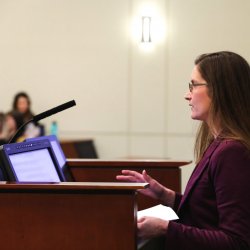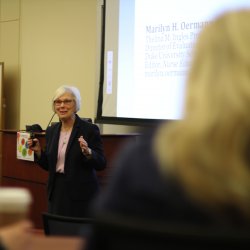 New Faculty Orientation
New Faculty Orientation
Background
The appointment of a new full-time faculty member represents the culmination of a thoughtful process that involves many individuals. Thus, when the individual arrives as a member of the faculty community, an investment has already been made, and the school looks forward to welcoming the new colleague. It is critical at this point that the orientation of that individual is comprehensive, well-organized and inclusive of a wide range of components that will help her/him be successful in the new appointment. This is as important for faculty who are experienced and have taught elsewhere as it is for those who are new to the faculty role, as the position will be implemented in a new environment with its own history, culture and priorities.
The importance of a strong orientation for new faculty has received significant attention in recent literature, which notes the importance of acknowledging and attending to the fact that individuals who assume a faculty position for the first time are making a work-role transition from that of expert clinician to that of novice academic educator. The orientation of new faculty – whether they are new to the role or experienced in it – is strengthened by attending to the competencies expected of academic nurse educators and ensuring that individuals are capable of fulfilling those competencies. Additionally, faculty benefit from assistance with prioritizing their many competing demands and formulating plans to meet the multiple demands of the role while still achieving their personal and professional goals.
Development of DUSON's Orientation Program for New Faculty
Throughout its history, the Duke University School of Nursing (DUSON) has been committed to orienting new faculty in a way that will help them successfully make the transition to a new position. To achieve this goal, DUSON refined its orientation program in 2009. The framework for the program now includes the following elements:
- Self-assessments
- Focused meetings with key individuals in the School and University
- A series of ongoing monthly meetings
- Faculty guides
- Clarification of responsibilities the new faculty member has throughout the orientation program
The orientation program is revised as needed, based on evaluative feedback.
The Self-Assessments
Prior to beginning employment, each new faculty member is asked to complete an online survey in order to rate her/himself regarding competence in each area of nurse educator ability (and accompanying task statements). This document reflects the nurse educator competencies developed and disseminated by the National League for Nursing [Halstead, J. (2007). Nurse educator competencies. New York, NY: National League for Nursing.] and are used with the permission of that professional association.
The educator competencies self-assessment is reviewed with the IEE Director so the orientation can be individualized and address areas of greatest concern to the new faculty member. Once the survey is complete, educators are given access to the DUSON Teaching Success Sakai site for modules, readings, and quizzes specific to the areas needing further study.
The Guides
Each new faculty member is provided with seasoned faculty who volunteer to invest time – in a deliberate way – to help new faculty transition to their new role and environment. Those seasoned faculty are referred to as guides, and a complete outline of the responsibilities of each is provided. Generally, the responsibilities are as follows:
- Culture Guide. This individual is expected to help new faculty understand the culture of DUSON and the University and how things work.
- Pedagogical Guide. The IEE Director fills this role and is expected to help new faculty with their teaching responsibilities.
- Research Mentor. This individual is expected to guide tenure track and research track faculty with their program of research.
- Scholarship Guide. This individual is expected to help practice track faculty with their scholarly endeavors.
The Ongoing Meetings
As a way to ensure that new faculty remain “connected” with one another and with the orientation program, each individual is invited to participate in a meeting each month during the first four to six months of employment. These meetings are facilitated by members of the IEE Advisory Board and may have a designated focus (e.g., governance, workload, student/faculty relationships) or be open to whatever questions/issues the new faculty wish to discuss.
Teaching Fellowship Program
 Background
Background
The primary purpose of the Duke University School of Nursing (DUSON) Teaching Fellowship program is to assist faculty in developing the scholarship of teaching. The program also is designed to recognize the importance of teaching, advance the pedagogical expertise of faculty and provide opportunities for faculty to continually develop that expertise in ways that will have a significant impact on the science and the practice of nursing education.
Fellowships are awarded for a two-year period (August to August), and Fellows receive financial support and workload reduction to ensure successful completion of their projects.
Goals of the Teaching Fellowship
For the individual faculty member selected as a Teaching Fellow, the program is designed to achieve the following goals:
- Foster the ongoing development of the scholarship skills of Fellows to enhance their ability to contribute to the development of the science of nursing education
- Support Fellows in their efforts to develop as educational leaders and change agents within DUSON, Duke University and the nursing profession
- Foster the ongoing development of the pedagogical expertise of Fellows to further enhance their skills as educator/scholars
- Facilitate Fellows’ development of a career trajectory that enables their successful induction into the Academy of Nursing Education
For the School of Nursing, the program is designed to achieve the following goals:
- Create a community of like-minded educator/scholars dedicated to enriching the field of nursing education and advancing educational excellence
- Promote the scholarship of teaching as integral to the faculty role
- Elevate teaching as a respected activity that requires scholarly inquiry and pedagogical expertise
- Contribute to improving the quality of teaching, learning, evaluation and curriculum design in nursing
- Expand the dialogue about teaching and learning among DUSON faculty and at the national level
- Build a framework that will define excellence in teaching at DUSON
- Create a cadre of faculty who will serve as pedagogical guides for new full-time faculty, support the IEE in creating and meeting its goals and lead in the preparation of DUSON’s applications for recognition as an NLN Center of Excellence in Nursing Education or some similar recognition of educational excellence
Application
Any full-time faculty member – regardless of rank, promotion track or tenure status – who (a) will have completed a minimum of two (2) years' full-time teaching by the start of the Fellowship, (b) has an interest in building her/his pedagogical expertise and (c) envisions a career trajectory that includes significant scholarly work in nursing education may apply for a Fellowship. Among other items, the Fellowship application asks the individual to share her/his:
- Teaching philosophy
- Personal goals related to development of pedagogical expertise and educational scholarship
- A letter of support from an education leader (inside or outside Duke/DUSON) who has agreed to mentor the Fellow
- Details of the project, including final deliverable(s)
Applicants also are asked to suggest teaching load reductions during the two-year Fellowship that would support completion of the proposed project and to sign an agreement documenting her/his willingness to devote the necessary time to Fellowship activities and completion of all deliverables.
Complete application packets must be submitted to the Director of DUSON's Institute for Educational Excellence (IEE) no later than December 31. The IEE Advisory Board reviews all applications and selects up to three Fellows each academic year; additional Fellows are selected if funds are available. All applicants are notified of the outcome of the review process no later than January 15.
Click here to learn about our current and former fellows.
Want More Information?
DUSON faculty who want to know more about the Teaching Fellowship program are encouraged to contact the IEE Director.